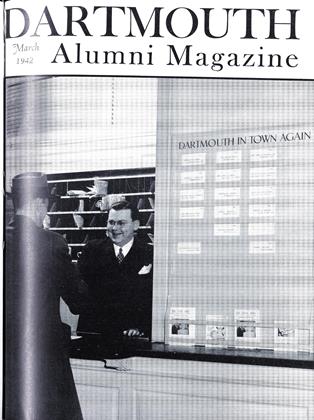by Charles T.Prouty '31, Columbia University Press,1942, pp. 333, $3.75.
MR. PROUTY HAS essayed, with generous amplitude, a stout and double task: the personal and family history of George Gascoigne, and a full analysis of his literary methods enlivened by interpretation and judgment of the work itself. In eight sub-headings and six appendices, based on old and new material, we have, it seems likely, the final scholarly overhauling of Gascoigne.
Life and letters are examined as types of mid-century transition, from the first groundswell of Henry's reign to the great wash of the eighties and nineties. The multifarious and inconstant life of George Gascoigne, as courtier, lawyer, soldier, literary Hydra, and laggardly convert and moralist, veered like many others through a spasmodic and contentious generation. In the experiments with verse, criticism, tragedy, comedy, satire, ordered prose, and conceits, so many of them useful to greater men, Mr. Prouty sees not only one literary career but a whole period of consolidation and careful trial. Through a study of career and period he hopes to learn why and how the work was done, and to understand better than others have the literature known to later Elizabethans in their youth. This hope is admirably fulfilled, and leaves for my question only the indulgent defense of Gascoigne's least pliant rule: "The necessity for rule was a principle which had to be firmly established before poets could venture to break away in variation." (p. 131). Valid in general, the apology fails to justify the fixed caesura and the end-stopped line, a needle~ss and wasteful surrender of gains which Gascoigne himself, at times, proves not too great for a modest talent to hold.
Since the author's literary judgments agree with mine, I am pleased to acclaim his taste. He appears to like best "The Adventures of Master F. J.," a bitter short novel whose characters are shrewdly studied, and the simpler lyrics, the kind that filled Elizabeth's England with gay and easy twittering. These and Gascoigne's life one likes without effort; his versatility and importance in literary history one grants, without quickened pulse but with a fresh and surprised interest after Mr. Prouty's intelligent scholarship.
 View Full Issue
View Full Issue
More From This Issue
-
 Article
ArticleTrials, Tribulations, Success
March 1942 By RALPH SANBORN '17 -
 Sports
SportsBig Green Teams
March 1942 -
 Class Notes
Class Notes1917*
March 1942 By EUGENE D. TOWLER -
 Class Notes
Class Notes1937*
March 1942 By DONALD C. MCKINLAY -
 Article
ArticleIndians Scout for the Fleet
March 1942 By LT. E. F. PLANK, UNITED STATES NAVAL RESERVE -
 Class Notes
Class Notes1931*
March 1942 By CHARLES S. MCALLISTER
Lucien Dean Pearson
Books
-
 Books
BooksFaculty Authors
February 1945 -
 Books
BooksJuxtapositions
December 1976 -
 Books
BooksMANAGEMENT POLICIES FOR COMMERCIAL BANKS.
JULY 1963 By G. WALTER WOODWORTH -
 Books
BooksI AND TEX.
OCTOBER 1972 By RIPLEY HANSEN -
 Books
BooksFaculty Books
December 1953 By Robert O. Blood Jr. '42 -
 Books
BooksFACULTY PUBLICATIONS
March, 1926 By Wayne E. Stevens



